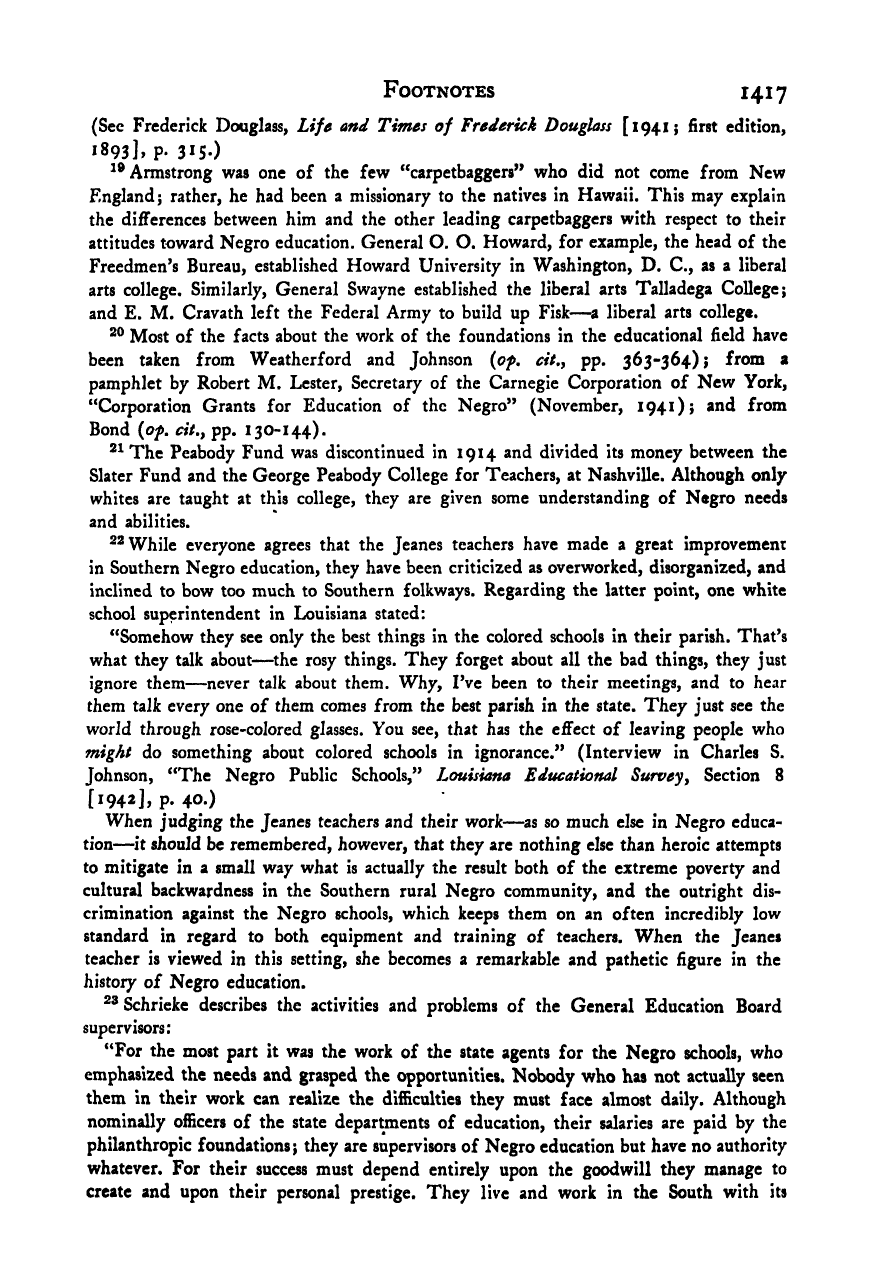Note: Gunnar Myrdal died in 1987, less than 70 years ago. Therefore, this work is protected by copyright, restricting your legal rights to reproduce it. However, you are welcome to view it on screen, as you do now. Read more about copyright.
Full resolution (TIFF) - On this page / på denna sida - Footnotes - Chapter 41

<< prev. page << föreg. sida << >> nästa sida >> next page >>
Below is the raw OCR text
from the above scanned image.
Do you see an error? Proofread the page now!
Här nedan syns maskintolkade texten från faksimilbilden ovan.
Ser du något fel? Korrekturläs sidan nu!
This page has never been proofread. / Denna sida har aldrig korrekturlästs.
Footnotes 1417
(See Frederick Douglass, Life and Times of Frederick Douglass [1941 ; first edition,
1893], P- 315-)
Armstrong was one of the few ‘‘carpetbaggers” who did not come from New
England; rather, he had been a missionary to the natives in Hawaii. This may explain
the differences between him and the other leading carpetbaggers with respect to their
attitudes toward Negro education. General O. O. Howard, for example, the head of the
Freedmen’s Bureau, established Howard University in Washington, D. C., as a liberal
arts college. Similarly, General Swayne established the liberal arts Talladega College;
and E. M. Cravath left the Federal Army to build up Fisk— liberal arts college.
Most of the facts about the work of the foundations in the educational field have
been taken from Weatherford and Johnson {of. cit.y pp. 363-364) ; from a
pamphlet by Robert M. Lester, Secretary of the Carnegie Corporation of New York,
“Corporation Grants for Education of the Negro” (November, 1941); and from
Bond {of. cit.y pp. 1 30-1 44).
The Peabody Fund was discontinued in 1914 and divided its money between the
Slater Fund and the George Peabody College for Teachers, at Nashville. Although only
whites are taught at this college, they are given some understanding of Negro needs
and abilities.
While everyone agrees that the Jeanes teachers have made a great improvement
in Southern Negro education, they have been criticized as overworked, disorganized, and
inclined to bow too much to Southern folkways. Regarding the latter point, one white
school superintendent in Louisiana stated:
“Somehow they see only the best things in the colored schools in their parish. That’s
what they talk about—the rosy things. They forget about all the bad things, they just
ignore them—never talk about them. Why, IVe been to their meetings, and to hear
them talk every one of them comes from the best parish in the state. They just see the
world through rose-colored glasses. You see, that has the effect of leaving people who
might do something about colored schools in ignorance.” (Interview in Charles S.
Johnson, “The Negro Public Schools,” Louisiana Educational Surveyy Section 8
[1942], p. 40.)
When judging the Jeanes teachers and their work—^as so much else in Negro educa-
tion—it should be remembered, however, that they are nothing else than heroic attempts
to mitigate in a small way what is actually the result both of the extreme poverty and
cultural backwardness in the Southern rural Negro community, and the outright dis-
crimination against the Negro schools, which keeps them on an often incredibly low
standard in regard to both equipment and training of teachers. When the Jeanes
teacher is viewed in this setting, she becomes a remarkable and pathetic figure in the
history of Negro education.
^^Schrieke describes the activities and problems of the General Education Board
supervisors;
“For the most part it was the work of the state agents for the Negro schools, who
emphasized the needs and grasped the opportunities. Nobody who has not actually seen
them in their work can realize the difhculties they must face almost daily. Although
nominally officers of the state departments of education, their salaries are paid by the
philanthropic foundations; they are supervisors of Negro education but have no authority
whatever. For their success must depend entirely upon the goodwill they manage to
create and upon their personal prestige. They live and work in the South with its
<< prev. page << föreg. sida << >> nästa sida >> next page >>